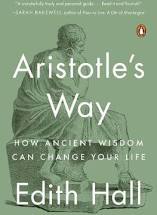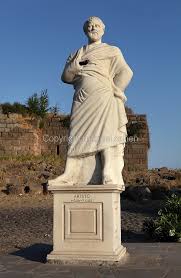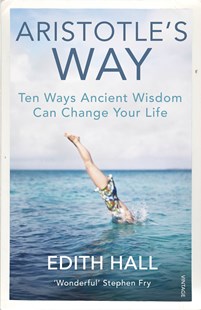GoodReads Meta-data is 336 pages, rated 3.65 by 519 litizens.
Genre: Popular Philosophy (as is Popular Science).
Verdict: More!

Classical historian Edith Hall delves into the mind and works of the one and only Aristotle her BFF. He is the leader of the pack as far she is concerned and there is no one else. The enthusiasm for the subject with the light touch, simple prose, punctuated with real life examples and references to the popular culture are delight. Though I doubt it got her tenure or promotion. On that more below.
At the outset she briskly dispatches two of the rotten tomatoes thrown at Aristotle. His remark that women lack deliberative capacity has empowered generations of the virtuous to hurl rotten fruit at him. Yet in the Politics there is a more fine-grained remark that women have deliberative capacity but it is not authoritative; if an interpreter were less interested in scoring retrospective points, this remark could be taken as a sociological fact of the time and place. In subsequent passages he goes to refer to wives running (ruling) the households of slaves, servants, extended family, provenders, tradesmen, and the like. This oikos is the economy which has become the god all worship now. Though, of course, he concedes less to woman than Plato does twice over.
The most common trope used to justify ignoring Aristotle is this remark:
‘Males have more teeth than females in the case of men, sheep, goats, and swine; in the case of other animals observations have not yet been made’ (Animalia 3). This obscure passage and paraphrases of it abound among those who specialise in cheap shots. Yes, Aristotle was wrong, but he was wrong because he was misinformed about observations, not because he did not value observations, though that it the drum most often thumped when this passage is cited. Let’s take that drumbeat seriously for a minute.
Though this statement is joyfully repeated on thousands of web sites, none of these bloggers themselves settle the empirical question empirically. No writer who has belaboured Aristotle with this remark has ever then said, and I counted (to be strictly parallel) my wife’s teeth and we have the same number. Think about that.
As any dentist will say, counting teeth is easier said than done. It is not just a matter of saying Aaah. Any ten people people on Oxford Street today may well not have the same number of teeth. Ditto dead bodies for the ghoulish. There are congenital omissions (I never had two adult molars), damage in childhood, and in Ari’s world most adult simply lost a lot of rotten teeth which accounts partly for all the soft food: olives, cheese, figs. But her main defence of him on this point is simply that it was a passing, incidental point in his biological studies which he cited from other sources as a fact. He neither proclaimed it himself, not declared it a priori. In the passage where it is cited, he draws no grand conclusion about the inferiority of women as thus proven by teeth. At most it proves difference.
The female of 1940s popular culture in film and fiction was flighty, easily frightened, weak, lacking concentration, physically inept stereotype. It continued into 1950s television where its steady diet went some way to make real the fiction it portrayed, repeatedly showing it so did make it so. It took a great effort — intellectual as well as social — to see through those shadows on the cave wall, single them out, test, and reject them, and for that All Hail.
The book is thematic starting the governing narrative of happiness, which is not an ephemeral feeling but a contentment and calm perhaps like zen, but she does not go that far. When I look at the gang leaders on television news these days… oh, did I say ‘gang leaders,’ I meant world leaders, none of them look contented and calm. They look driven, angry, confused even, bitter, overwhelmed, determined, purposeful in some cases. There are far too many angry old men who have never had anything to be angry about and aren’t going to take it any longer!
She does not mention Jean Vanier, Happiness – Aristotle for a New Century (2002). But it is a companion piece, though it lacks the depth of the volume at hand.
She goes on to treat such topics as Family, Friendship, and Mortality. There is also a discussion of discretion that made me uncomfortable. In my years as Associate Dean, Institute Director, Head of Department I made it a point not to exercise discretion. My rule was: what cannot be done for all that cannot be done for one. Believe me there were a great many instances of special pleading, mostly by staff, but some by students. But I knew that to concede one would set off an avalanche of more pleaders. To say yes, would be to open the flood gates.
Confession: I did make one exception. As Associate Dean there was always tsunami of special pleading about admission. Students whose track record made it abundantly clear they could not do the work of the course, wanted to pay the tuition. I aways rejected them on the ground that no one should be admitted to fail. Even so on one occasion a letter of appeal got through the buffers from one Veronica. She had done the HSC fifteen years before and hashed it. Since then she had done all manner of things including very successful study on TAFE, and she wanted to go to University to do things not available at TAFE. If she had applied on the basis of the TAFE results, she would have been admitted. However, in NSW one never escapes the HSC score and hers was so lousy that it pulled down the TAFE results. That ghostly and ghoulish HSC result was always going to be there. I admitted her. (Though I never made her acquaintance I noted that she graduated in minimum time with a credit average.)
Back to Aristotle and our author, who went to and spent time everywhere Aristotle did, walking where he walked. Who paid for that junket? Well whoever did spent the money did well. That tactile immersion adds depth to the page.
It is a book by an Aristotelian scholar but not one that is not written for Aristotelian scholars, and therein lies the reference to tenure above. Nor is it a textbook which a promotions committee might grudgingly acknowledge at a heavy discount.

titles for me to read.
When I gathered the meta-data from GoodReads my eye fell on a few of the niggardly comments, reminding me why I don’t read them. So pompous, so self-centred, so much like a department meeting.
Peersonal note. When we traversed the Anatolian plateau in 2015 one of our stops was Assos on the Aegan Coast. I was keen on this when I saw it in the program because Aristotle lived there for a time and married a woman from there. The tour guide assured me that in 2009 a statue of Ari had been erected to affirm the connection.
Our stay at Assos was rainy and the roads were clogged with desperate Syrian refugees who could see the European Union a few miles away across the water in the Greek island of Lesbos. The plinth for the statue of Aristotle was there but not the likeness. It had been vandalised and dismounted for repairs. I have since learned it was replaced in 2017.


